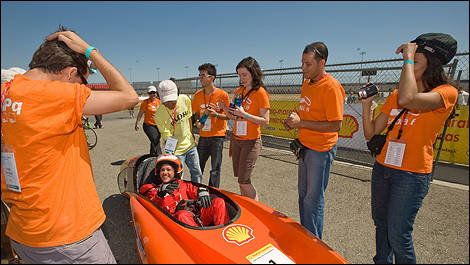Distance, not speed, was the goal this weekend on the track at the 2009 Shell Eco-marathon Americas, an event held at the Auto Club Speedway in Southern California on April 15-18, 2009. In this challenge, University and High School students design, build and test fuel-efficient vehicles that travel the farthest distance using the least amount of fuel. And this year Canadians took first prize!
The Laval University Alerion Supermileage team from Québec City came out on top with an astonishing fuel consumption of 1,172.2 km per liter (0,0853 liter/100 km) and won a US$5,000 grand prize in the "Prototype" category with a gasoline-engined vehicle called NTF 3.0.
In the "Urban Concept" category - new to the Eco-marathon Americas event this year - the team Mater Dei High School from Evansville, Indiana, took the first prize by achieving 0,542 liter/100 km.
Students from the Americas
This year, 44 participating teams were on hand to stretch the boundaries of fuel efficiency. With more than 500 students from six high schools and 29 universities from North and South America, including Brazil, Canada, Mexico, the United States, and a guest team from India, competition was steep.
"We knew coming into the challenge this year that we would have a lot to go up against," said David Vallée of Laval University. "But we had confidence in our vehicle and all the hard work that had gone into building it over the past year. We're just excited the long hours paid off and we were able to win the 2009 Shell Eco-marathon Americas!"
Students let their imaginations run wild
"The Shell Eco-marathon is a platform for students to let their imaginations run wild," said Mark Singer, global project manager for the Shell Eco-marathon. "By encouraging these students to build vehicles with greater energy efficiency, we hope this will help inspire others; and together we can find solutions that will help meet the global energy challenge."
This year, student teams were invited to participate in either the Prototype or Urban Concept categories. For the Prototype category, teams entered futuristic prototypes - streamlined vehicles focused on maximizing fuel efficiency through innovative design elements, such as drag reduction. For the UrbanConcept category, teams entered more "roadworthy" fuel-efficient vehicles. Aimed at meeting the real-life needs of drivers, these vehicles are closer in appearance to the cars seen on roads today.
 |
| The Laval University Alerion Supermileage team from Québec City came out on top. |
The Laval University Alerion Supermileage team from Québec City came out on top with an astonishing fuel consumption of 1,172.2 km per liter (0,0853 liter/100 km) and won a US$5,000 grand prize in the "Prototype" category with a gasoline-engined vehicle called NTF 3.0.
In the "Urban Concept" category - new to the Eco-marathon Americas event this year - the team Mater Dei High School from Evansville, Indiana, took the first prize by achieving 0,542 liter/100 km.
Students from the Americas
This year, 44 participating teams were on hand to stretch the boundaries of fuel efficiency. With more than 500 students from six high schools and 29 universities from North and South America, including Brazil, Canada, Mexico, the United States, and a guest team from India, competition was steep.
"We knew coming into the challenge this year that we would have a lot to go up against," said David Vallée of Laval University. "But we had confidence in our vehicle and all the hard work that had gone into building it over the past year. We're just excited the long hours paid off and we were able to win the 2009 Shell Eco-marathon Americas!"
Students let their imaginations run wild
"The Shell Eco-marathon is a platform for students to let their imaginations run wild," said Mark Singer, global project manager for the Shell Eco-marathon. "By encouraging these students to build vehicles with greater energy efficiency, we hope this will help inspire others; and together we can find solutions that will help meet the global energy challenge."
This year, student teams were invited to participate in either the Prototype or Urban Concept categories. For the Prototype category, teams entered futuristic prototypes - streamlined vehicles focused on maximizing fuel efficiency through innovative design elements, such as drag reduction. For the UrbanConcept category, teams entered more "roadworthy" fuel-efficient vehicles. Aimed at meeting the real-life needs of drivers, these vehicles are closer in appearance to the cars seen on roads today.
 |
| Team Sabia from Brazil won the "Design Award" with this vehicle. |


